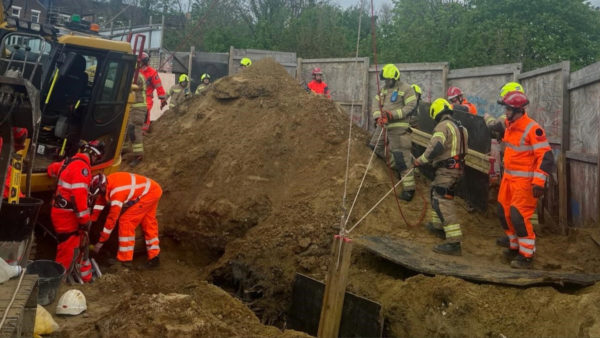
The director of a subcontractor that unwittingly employed victims of modern slavery has advised other firms to “ask awkward questions”.
The director’s experience of helping to root out modern slavery within the company’s ranks forms part of a major new report by independent anti-slavery commissioner Dame Sara Thornton.
The report examines the risks and drivers of labour exploitation in construction. It follows a large-scale police investigation, Operation Cardinas.
Romanian crime group
Operation Cardinas took down a Romanian organised crime group which infiltrated the supply chains of construction projects across London and the South East for nearly a decade.
The gang put an estimated 300 to 500 victims onto commercial and residential projects between 2009 and 2018.
Three members of a Romanian family were found guilty of modern slavery offences in 2019. Grigore Lupu, then 39, was jailed for 10 years. His older brother Alexandru, 43, received an eight-year sentence while their nephew Valentin, 24, received 10 years.
Gang’s methods
The Lupus recruited their victims in Romania on the promise of decent wages by local standards. But they were tricked into debt and destitution. The traffickers offered work in the UK at the rate of £500 for 30 days, but they did not explain to the victims that the £500 was calculated on 30 working days, not including weekends. Even this deal evaporated on arrival.
The traffickers also promised they would pay the victims’ travel, accommodation, food, work permit and PPE costs. But in fact they ‘deducted’ these costs from the workers’ promised salaries, trapping them in debt.
The gang would use ‘bread crumbing’ techniques to manage victims’ expectations. They would continually reassure them that they would receive full pay once they had cleared their debts. The traffickers gave the victims ‘pocket money’ of at best £10-£20 a day, which made them reluctant to leave.
The gang also charged them up to four times the cost of a CSCS card, even though the cards they issued were recycled or fraudulently obtained. And the gang withheld the workers’ ID cards and passports, opened bank accounts in their names but gave them no control over them, and forced them to dodge travel fares or use child tickets.
In total, the Lupus made an estimated £2.4m from the exploitation.
Construction firm protected victims
One unnamed construction company contacted by police during Operation Cardinas took action to protect modern slavery victims.
The company, which typically has around 40-50 live projects at a time, has a high proportion of migrant workers.
Police contacted the firm in 2018 asking for details of two workers. Subsequently, an employee decided to conduct her own payroll investigation, in which she discovered a number of bank accounts linked to the same workers. The company began to suspect that instead of just two people, traffickers had hidden 12 potential victims within its operations.
“Our advice to other organisations is, ask awkward questions. Make sure people are who you think they are. This is a bigger problem than industry realises.”
After discussions with police, the company let the workers continue on its sites, allowing the investigation to continue without alerting the traffickers.
The construction director of the company said: “At this point I took a deep breath. It’s a natural instinct to want to get rid of the risk immediately, but we didn’t want to kick the problem down the road. We wanted to manage it. We felt a moral commitment to the people that were being abused.”
Long investigation
The director moved all the victims onto one large project and did not give them work that was too physically arduous.
“I put one of my most diplomatic and robust managers on site with them,” he said. “We hadn’t seen any sign of violence, but I chose someone that would be able to step in and intervene if there was trouble.”
The company devised a fake pilot scheme to give workers vouchers in the site canteen, to ensure they received free nutritious food every day.
The investigation lasted 18 months, but only four people in the company – the CEO, construction director, site manager and payroll worker – were aware of what had happened. The construction director said: “We use our experience to explain how the situation arose, and how challenging it can be to spot the signs. Our advice to other organisations is, ask awkward questions. Make sure people are who you think they are. This is a bigger problem than industry realises.”
Challenges for contractors
The new report warns that contractors face particular challenges in managing the risk of modern slavery, including:
- The high turnover of workers on building sites which makes it difficult to process and monitor individuals
- The sector’s heavy reliance on temporary and migrant labour
- The complex network of subcontractors and labour agencies, resulting in poor visibility of worker conditions at lower levels of supply chains
- In addition, contractors are grappling with a chronic skills shortage and a dwindling supply of workers from the European Union due to the pandemic and Brexit
Good practice
Good practice identified within the sector included:
- Cross-departmental modern slavery working groups
- On-site worker engagement initiatives and worker interviews
- Deeper dives into supply chains through audits, visits and targeted training
- Multi-stakeholder projects, where competitors share data and intelligence to improve audit strategy, enhance training and identify other practical interventions
- An example of an ethical management system – a systemic approach to labour management, encompassing internal operations, supplier relationships and the site workforce
- Strategies and targets to reduce reliance on temporary labour
‘Harrowing reminder’
Dame Sara Thornton said: “While the construction sector is striving to meet its sustainability and carbon targets, it faces particular challenges in the ethical management of labour. Operation Cardinas is a harrowing reminder that no organisation can afford to be complacent, and that every worker has a role to play in spotting the signs.
“Operation Cardinas is a harrowing reminder that no organisation can afford to be complacent, and that every worker has a role to play in spotting the signs.”
“I would like to thank all the organisations that contributed to this report. It is encouraging to see a number of joint initiatives progressing. I hope that more contractors will be persuaded to join them in a spirit of openness and sharing. Collaborative working is critical for tackling criminality, poor compliance and ruthless opportunism. The support, understanding and strong leadership of clients will also be essential setting the right tone and driving cultural change.
"I hope that the government’s plans to create a Single Enforcement Body, bringing together the Gangmasters and Labour Abuse Authority, the Employment Agency Standards Inspectorate and HMRC’s National Minimum Wage team, will provide a more coherent platform for support, helping to drive up standards while simultaneously holding businesses to account.”
Read the full report here.










